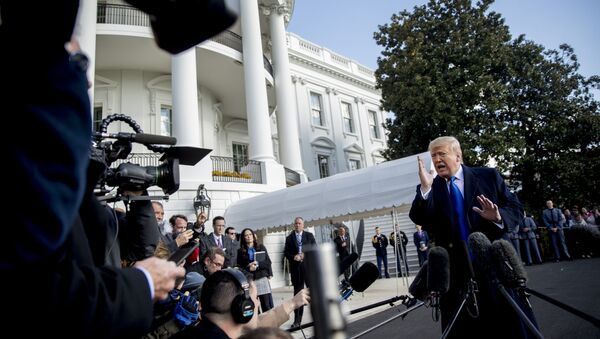Senior members of the Trump administration are embroiled in political infighting over the ongoing impeachment process, The Washington Post reports.
The strife allegedly revolves around Mick Mulvaney, the acting chief of staff, and Pat Cipollone, Donald Trump’s White House counsel. Both have refused to appear before House Democrats for testimony; Mulvaney’s office instructed the former and incumbent staffers who have been subpoenaed to follow suit, but some have agreed to testify nonetheless.
Sloppy defence strategy
Mulvaney’s office “blames” Cipollone for his perceived lack of effort to prevent those staffers from complying with the subpoenas, US officials told The Washington Post on condition of anonymity.
“Those who have aligned with the president and followed the president’s instincts on not to cooperate have been successful and been that firewall,” one official said, adding that Cipollone “has been pretty weak in ensuring people are on lockdown.”
It is understood that the Trump administration’s response to the impeachment inquiry – in particular the sluggish efforts to build a legal team to stymie it – have drawn much concern on Capitol Hill.
“This impeachment trial is going to be here before the White House knows it and they’re not even remotely prepared for it,” a Senate Republican aide was quoted as saying.
“What they need desperately is leadership to get ready, but until Mulvaney and Cipollone put aside their petty squabbles and start working together all they’ll have is tweets.”
Phone call transcript and a disputed hiring
Relations between Mulvaney and Cipollone – and therefore Team Trump’s defensive strategy – have reportedly suffered another blow after Cipollone’s office released the rough transcript of Trump’s July phone call with Ukrainian President Zelensky, which was initially at the centre of the impeachment inquiry. Mulvaney apparently hadn’t been aware of this move and opposed it.
Mulvaney and Cipollone are also said to have had a falling-out over the botched attempt to enlist former congressman and Fox News contributor Trey Gowdy as an outside counsel to Trump’s legal team. Mulvaney favoured the hiring but Cipollone opposed it, according to the report, and Gowdy was allowed to join the team only starting in January due to lobbying rules.
Nulvaney's 'confession'
Additionally, Mulvaney recently admitted on camera that the Trump administration had held up military aid to Ukraine to prompt investigations into corruption allegations, including against the Democratic 2020 front-runner Joe Biden. “We do that all the time with foreign policy,” he explained.
"To be clear, what you described is a quid pro quo" -- Mick Mulvaney just admitted in a briefing that Donald Trump held back aid to Ukraine as leverage to get the Ukrainian government to investigate Democrats and the 2016 election: pic.twitter.com/HHxzlkoJcS
— #MarchForTruth (@MarchForTruth17) October 17, 2019
Mulvaney said in a subsequent statement that he did not confirm a quid pro quo – which essentially is the core of the impeachment inquiry – and that his remarks were misrepresented. Cipollone did not want Mulvaney to hold the news conference and blamed him for “ma[king] matters worse”, senior Trump advisers told the WaPo on condition of anonymity.
The White House rejected the report and said there is no infighting. “We are one team and we work well together. The palace intrigue stories are false and they need to stop,” spokesperson Stephanie Grisham said in an emailed statement.
Several witnesses who have already testified to members of Congress behind closed doors have confirmed a quid pro quo between Trump and Ukraine, an accusation the President vehemently denies.
The public phase of the hearings begins on Wednesday, 12 November, with the testimonies of charge d’affaires in Ukraine Bill Taylor and Deputy Assistant Secretary for European and Eurasian Affairs George Kent. Former envoy to Ukraine Marie Yovanovitch, another key figure in the inquiry, is scheduled to testify in public on Friday. House Democrats leading the inquiry are expected to wrap it up by year-end; the Democrat-controlled House will then vote on articles on impeachment and hand them over to the Senate, where a trial would take place next year.


